 MyDogBreeds
MyDogBreeds Vizsla is originated from Hungary but Beagle is originated from United Kingdom. Vizsla may grow 13 cm / 5 inches shorter than Beagle. Vizsla may weigh 19 kg / 42 pounds more than Beagle. Vizsla may live 6 years less than Beagle. Vizsla may have less litter size than Beagle. Both Vizsla and Beagle requires Low maintenance.
Vizsla is originated from Hungary but Beagle is originated from United Kingdom. Vizsla may grow 13 cm / 5 inches shorter than Beagle. Vizsla may weigh 19 kg / 42 pounds more than Beagle. Vizsla may live 6 years less than Beagle. Vizsla may have less litter size than Beagle. Both Vizsla and Beagle requires Low maintenance.
 The Hungarian Vizsla or Magyar Vizsla is a hunting dog developed in Hungry. It is the smallest of the pointer-retriever type breeds. They are loyal family dogs and hunt fowl and upland game. It was rare for a hunting dog to also be a companion and family dog, but the Vizsla is. The first time the Vizsla came to the attention of anyone outside its area was 1357 in a publication written for King Louis I of Hungary. They were kept mostly by barons and warlords and preserved without any interbreeding for centuries.
The Hungarian Vizsla or Magyar Vizsla is a hunting dog developed in Hungry. It is the smallest of the pointer-retriever type breeds. They are loyal family dogs and hunt fowl and upland game. It was rare for a hunting dog to also be a companion and family dog, but the Vizsla is. The first time the Vizsla came to the attention of anyone outside its area was 1357 in a publication written for King Louis I of Hungary. They were kept mostly by barons and warlords and preserved without any interbreeding for centuries.
Through all the occupations, revolutions and world wars, the Vizsla survived. Still there were some points in their history where they were almost extinct. In the 1800’s English Pointers and German Shorthaired Pointers almost replaced them. After World War II they were almost extinct again with only a dozen or so left in the country.
Breeders across Hungry brought them back again. They were also bred in Serbia, Slovakia, Austria and Romania. They came to the states after the war and quickly were embraced. The Vizsla Club of America was formed so that they could be recognized by the American Kennel Club. This happened in 1960 and the Vizsla quickly became a champion in several AKC specialties.
The Weimaraner, the German Shorthaired Pointers, the Wirehaired Vizsla and other pointers were developed from the Vizsla and then used to re-establish the breed following World War II.
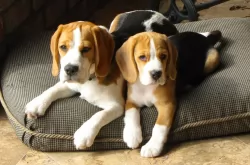 There are some accounts of similar size dogs used for hunting in Greece in 5th century BCE. During 8th century the Talbot Hound breed was created. In 11th century Talbot Hound was brought to England by William the Conqueror. While using in hunting they are found to be a slow runner. To overcome the situation and increase their running speed the hunting people bred Talbot Hound with Grey hounds. The beagles described earlier were very small in size and are said as pocket beagles.
There are some accounts of similar size dogs used for hunting in Greece in 5th century BCE. During 8th century the Talbot Hound breed was created. In 11th century Talbot Hound was brought to England by William the Conqueror. While using in hunting they are found to be a slow runner. To overcome the situation and increase their running speed the hunting people bred Talbot Hound with Grey hounds. The beagles described earlier were very small in size and are said as pocket beagles.
 The golden/rust colored Vizsla is easily distinguished from other breed. They are a medium sixed pointer with a lean frame and light on their feet. They have long ears that are silky to the touch and well defined muscular structure. Their nose is a red color blending in with their coat color. Their eyes and nails also blend in with the color of the coat.
The golden/rust colored Vizsla is easily distinguished from other breed. They are a medium sixed pointer with a lean frame and light on their feet. They have long ears that are silky to the touch and well defined muscular structure. Their nose is a red color blending in with their coat color. Their eyes and nails also blend in with the color of the coat.
For the most part they are some shade of golden-rust, but today there are also some solid rust dogs as well. Officially the coat can be russet gold, copper-brown, or dark sandy gold. It cannot be mahogany red or pale yellow. The coat is dense, smooth, short and without an undercoat. They have docked tails as well.
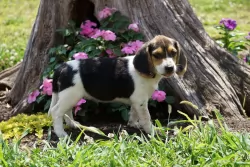 They are small and compact breed, and always happy and fun loving. They should be trained by patient and creative training techniques. Beagles are very much interested in using their nose in finding interesting scents and are food focussed. They always wake their neighbours at 6 am by their half howling. They think everyone is their best friend and love to have friendship with other animals and humans. They have about 220 million scent receptors and are said as "a nose with feet" by humorist Dave Barry.
They are small and compact breed, and always happy and fun loving. They should be trained by patient and creative training techniques. Beagles are very much interested in using their nose in finding interesting scents and are food focussed. They always wake their neighbours at 6 am by their half howling. They think everyone is their best friend and love to have friendship with other animals and humans. They have about 220 million scent receptors and are said as "a nose with feet" by humorist Dave Barry.
We can see beagles at many airports in their duty. They can easily trace out the illegal things being smuggled. Since they are small in size they are suitable for apartment living. But they like to walk around several times. They should be exercised for plenty of time. Obedience training should be given to them by giving food reward. Beagles are wanderers of nature and so if possible they will try to escape. So it is necessary to make them microchipped or to wear a collar, to find them easily.
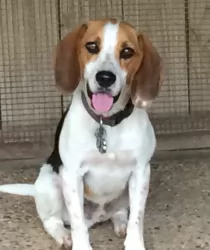 They are very good companion for children. They love to play and spend time with children.
They are very good companion for children. They love to play and spend time with children.
They have millions of scent receptors and so they can be seen in Airports and many important places in duty. Also they are interested in hunting small rodents.
They adapt well for apartment living but they don't like being alone for a long time. If kept alone for a long time in back yard they will begin to bark and dig pit or try to escape. Beagle likes hot weather more than cold weather.
Beagles are difficult to train up. Many people say it will take about one year to house train beagles. They have an attitude of "what's in it for me". But it depends on the personality and temperament of the individual.
 The Vizsla have few health issues but the ones they do have are quite serious. They include:
The Vizsla have few health issues but the ones they do have are quite serious. They include:
• Cancer (Mast cell, Lymphoma and Hemangiosarcoma) – as will most dogs it can be treated but is still likely to kill the dog.
• Hip dysplasia is rare, but cases have been noted. Can cause lameness and/or arthritis.
• Sebaceous adenitis – rare skin disease found more often in cats or birds than in dogs.
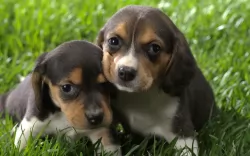 Beagle's ears should be checked occasionally for any sign of infections like discoloured wax, dirt or foul odour. Also their nails should be trimmed regularly. They should be exercised regularly in order to maintain a proper weight. The most common health problems in beagles are obesity, epilepsy and allergies.
Beagle's ears should be checked occasionally for any sign of infections like discoloured wax, dirt or foul odour. Also their nails should be trimmed regularly. They should be exercised regularly in order to maintain a proper weight. The most common health problems in beagles are obesity, epilepsy and allergies.
They are average shedders and having short hair thus it is easy to groom. They should be made to bath with a mild and non irritant shampoo.
 Feeding the puppy This is a very active dog and he need a high calorie diet as a puppy. Feed 4-5 cups in 3-4 smaller meals per day.
Feeding the puppy This is a very active dog and he need a high calorie diet as a puppy. Feed 4-5 cups in 3-4 smaller meals per day.
2.Feeding the adult Feed the adult high calorie food if you exercise her enough. Feed 3 cups of food twice a day.
4. Exercise They love to run but don’t’ overdo it until they are at least 18 to 24 months old. They stay very playful their entire lives and excel at AKC competitions. They are good at agility, field trials, scent work, obedience, conformation, dock diving, rally, lure coursing, track and barn hunt.
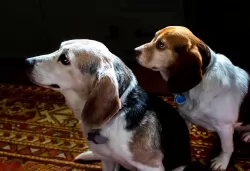 After 4 weeks of birth the puppy can be given solid foods by slowly increasing the ratio for many weeks. The recommended food is fresh meat of chicken breast, lamb, turkey and lean hamburger. The vegetables can be given as raw or steamed. The vegetables that will be good for them are raw baby carrots, broccoli, cauliflower and sweet peas. The puppies should be fed 3 to 4 small meals per day as they require more nutrients for their growth.
After 4 weeks of birth the puppy can be given solid foods by slowly increasing the ratio for many weeks. The recommended food is fresh meat of chicken breast, lamb, turkey and lean hamburger. The vegetables can be given as raw or steamed. The vegetables that will be good for them are raw baby carrots, broccoli, cauliflower and sweet peas. The puppies should be fed 3 to 4 small meals per day as they require more nutrients for their growth.
The grown up dog should be fed with the same food and 1 complete meal is enough for them. The meal should be given at noon. The food should be given based on calories as they should not get overweight. In addition to food, fruits such as blueberries, raspberries, banana and mango can also be given to them periodically.
Beagles should be exercised daily in order to maintain proper weight. Beagles are average shedders and having short hair which is easy to groom. They should be made to bath periodically with a mild shampoo.
Moderate exercise such as walking and cardio exercise such as chasing a ball should be given to them for staying them to be active and for maintaining good health.